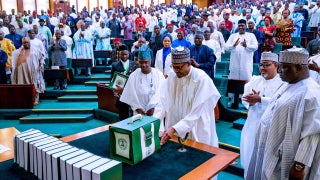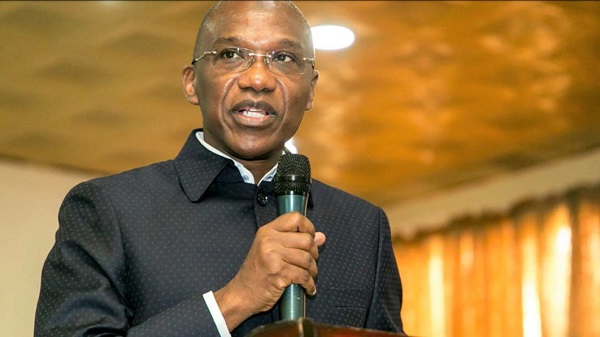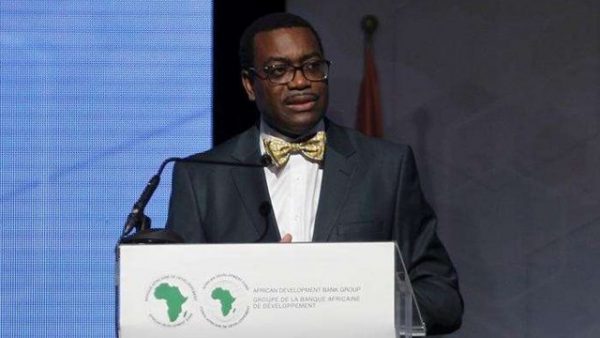Senators fault Buhari’s budget, vow overhaul
 • Lament higher debt servicing, lower capital expenditure • Say projection on increased oil production flawed • Fiscal plan is focused, APC chieftain insists
• Lament higher debt servicing, lower capital expenditure • Say projection on increased oil production flawed • Fiscal plan is focused, APC chieftain insists
Senators yesterday criticised the N10.33 trillion 2020 budget presented by President Muhammadu Buhari for lacking the capacity to boost growth, declaring they would “take over” and “redirect” the economy. Leading the debate, Senate Majority Leader Yahaya Abdullahi said: “The Capital Budget to GDP Ratio is rather too small, (about two per cent of GDP).” According to him, “The injection of this amount is a mere drop in the ocean and is incapable of stimulating the economy to higher growth, wealth creation and employment generation.”
He noted: “The projections of increased oil production averaging 2.18 million barrels/day, in the medium term, are subject to very high risks that have had devastating consequences in recent times. Volatility, both at the international market and in the Niger Delta, is a factor that could make these expectations only tentative.”
Abdullahi reviewed the allocation for capital development in the budget bill, saying: “When viewed in terms of per capita, the 2020 capital expenditure of N2.46 trillion, is paltry.” He argued that the projected high deficit of N2.18 trillion for 2020 is a direct function of the economy-wide revenue shortfall, as well as the choice and cost of borrowing.
“Government, particularly the collecting agencies, must improve on their collection capacity. But to do this, there must be robust investments in the real sector so that it could grow to earn taxable revenues.” He faulted the Central Bank of Nigeria’s “baffling” pursuit of restrictive monetary policy “in the face of a clear economic necessity to reflate the economy, particularly by ensuring cheap money to power the real sector of the economy.”
“I have, on the floor of this chamber, repeatedly called for the realignment of the country’s monetary and fiscal policies to ensure the right structural momentum in the economy,” he said.
Minority Leader Enyinnaya Abaribe rose to speak thereafter, thanking Abdullahi for making his (Abaribe’s) job easier. He described a fiscal plan as “nothing but a budget of taxation,” wondering how Buhari could talk about job creation, having failed to invest in things that create jobs.He said: “Debt servicing, as a component, is higher than capital expenditure,” noting that the projected growth, as read by the president, is 1.9 per cent less than the population growth of 2.6 per cent.
“So, if you look at it globally, we are still struggling. That is why I was very happy when the Senate Leader said we may have to take over and redirect the economic policy of this government, having seen that the executive has not done anything.”Senator Gabriel Suswam warned that the economy should not be allowed to deteriorate further. “Our economy has come to a level that this Senate needs to take over and redirect its affairs,” he said. He further expressed concern that persistent borrowings would increase budget deficit.
Former Deputy Senate President Ike Ekweremadu advised lawmakers to fashion out a good budget that would grow the economy. “The president has done his job,” he said but added: “It is left for us to subject the budget to legislative scrutiny. We can’t blame the president if we fail to subject the budget to scrutiny.”
He further expressed disappointment that at a time the nation is seeking ways of diversifying its economy, the budget failed to place ample emphasis on solid mineral development.On his part, Senator Adamu Alewo (APC, Kebbi State) regretted that the budget does not address poverty. “The level of poverty is still very high therefore we should monitor whatever vote is allocated for social investment programmes,” he said.
address the imbalance in the distribution of projects across geo-political zones.Senator Thompson Sekibo (PDP, Rivers) said Buhari should have pegged the budget at N8.1 trillion, advising: “Let us restrict ourselves to the money we can generate.” Besides, he noted that the president’s statistics on GDP and inflation reduction are very unrealistic.
In another reaction to the budget, the Chairman of the Society for Analytical Economics, Prof. Godwin Owoh told The Guardian that the president should have reflected the expected half-year spillover that would be cut off in the event that the 2020 plan comes into force on January 1 next year.
“There should be a quantitative recall of the cut-off value, so that it can be reflected on the spending items of the current budget, failing which might lead to abuse because this is already approved spending. Alternatively, he has to present a bill to extinguish the spillover spending, to avert a situation where this spending will be outside the government’s financial control and might affect economic variables,” Owoh said.
But the budget received commendation from Alhaji Shehu Kawo, a chieftain of the ruling All Progressives Congress in Niger State, who described it as “well focused.”
Speaking during an interview with the News Agency of Nigeria (NAN) in Minna yesterday, he said the content of the budget and its distribution to various sectors evidenced commitment, seriousness and transparency.He added that the early submission of the budget to the National Assembly would give the lawmakers ample time to work on the proposed estimates.







